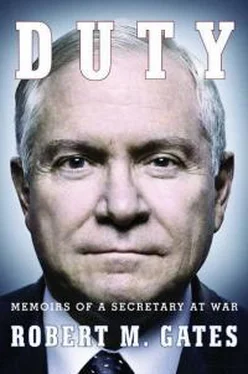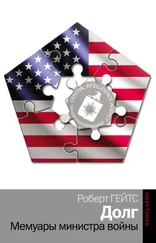Many argue today that the strategy shift and associated troop increase that Obama approved in late 2009 was a big mistake. I continue to believe it was the right decision. By 2008, the Taliban had regained the momentum in Afghanistan as the United States applied what was essentially a “counterterrorism-plus” strategy that allowed large swaths of the country (particularly in the south and east), including some key population and economic centers, to fall under Taliban domination if not outright control. Despite a near-doubling of the international troop presence in Afghanistan during the Bush administration after I became defense secretary, we were not winning. Our approach was a formula for stalemate, or worse.
The deployment of 21,000 more U.S. troops in February–March 2009 was in response to a request toward the end of the Bush administration from commanders and was intended to blunt the Taliban 2009 offensive and, secondarily, as I’ve said, to help provide some protection for the elections later that year. It was a request Bush was prepared to approve, but he held off at the request of the incoming Obama team. That force was not sized by the military to accomplish the strategy—the mission—Obama decided upon in February. In February and March, the president, I, and virtually all the senior leaders in Washington, including in the Pentagon, thought we were finished adding forces in Afghanistan. But McChrystal’s summer assessment for the first time put a true military price tag on achieving the broad objectives Obama had decided upon.
What was clear by fall was that the alternative paths forward in Afghanistan were either a significant increase in forces or a dramatic scaling back of our presence and our mission, the alternatives I proposed to Obama in my October 2009 memo. Despite all the arguments I heard then and all the commentary I have read since, I have not seen critics of Obama’s decision spell out precisely what would have been the consequences of standing pat in a losing posture, or the consequences of turning to a quite different strategy with a significantly smaller U.S. military presence. In the latter case, no one has spelled out how that approach would have been able to prevent a Taliban return to power throughout much, if not all, of Afghanistan and the reestablishment of al Qaeda there. The December 2009 decisions and related troop surge provided sufficient military forces to break the stalemate by rooting the Taliban out of their strongholds and keeping them out while training a much larger and more capable Afghan army.
Obama was much criticized by conservatives and hawkish commentators for announcing that the troop surge in Afghanistan would begin to be drawn down in July 2011, and that all U.S. combat troops would be withdrawn and all responsibility for security transferred to the Afghans by the end of 2014. Inside the military, there was also much grumbling about the numerical limits he placed on troops. I believe Obama was right in each of these decisions.
After eight years of war in Afghanistan, Congress, the American people, and the troops could not abide the idea of a conflict there stretching into the indefinite future. The “war of necessity” to punish and root out those responsible for 9/11 had become an albatross around the nation’s neck, just as the war in Iraq had, and by 2009 public and congressional patience was nearly gone. By adopting Karzai’s deadline of full transfer of security responsibility from foreign forces to Afghans by the end of 2014, the president made clear to Americans—and to our troops—that this was not an endless war. Just as I had bought more time for the surge in Iraq by foreshadowing troop withdrawals, with the deadlines Obama politically bought our military—and civilians—five more years to achieve our mission in Afghanistan.
The timelines also finally forced a narrowing of our objectives to those attainable in that time frame. I was convinced that we could dramatically weaken the Taliban and strengthen the Afghan army during that period—and if not, then we probably never could. The deadline put the Afghan government and security forces on notice that they had to step up their game, for their own survival if nothing else. To the argument that the 2014 deadline signaled to the Taliban how long they had to wait before taking over, I said at the time that they had at least five years of hard fighting ahead of them, including against advanced Western armies, and that every day the Taliban chose to “wait us out,” they would grow weaker as the Afghan forces grew stronger.
In deciding to begin drawing down the surge in July 2011, the president transformed our commanders’ estimate that they could transfer places they had seized from the Taliban to Afghan security within two years into a mandate. I had hoped that the drawdowns in the last six months of 2011 would have been smaller than the president decided. Still, overall U.S. troop strength in Afghanistan did not fall below pre-surge levels until September 2012, more than three years after the first Marine surge arrived in Helmand. The surge was sustained in Afghanistan twice as long as in Iraq.
Inside the Pentagon, the U.S. troop cap in Afghanistan of 101,000 was highly unpopular, viewed as a seemingly arbitrary political restriction on forces available to the field commander. It grated badly especially on the Army and Marine Corps. I think that Obama and his ever-suspicious staff welcomed the numbers approach—and a cap—because it gave them a mechanism to prevent the military from sneaking in more troops under the guise of “enablers.”
For me, managing the troop cap was just one more challenge in trying to achieve military success in Afghanistan. Every week after the Afghan surge began, I met with the chairman and Joint Staff to ensure that we would not exceed the number of troops the president had approved. This accounting process became a huge chore, consuming countless man-hours, and commanders felt their hands were tied by a political decision on troop levels. I was convinced, however, that without these controls, the number of deployed troops would steadily inch upward, not as part of some military ruse to get more troops but because of the inexorable pressures from commanders as other assets were required. (I remembered vividly how Bush’s surge went from 21,500 to 30,000.) Virtually every military commander in history has wanted more troops to enhance the prospect for victory—and to reduce his forces’ casualties through overwhelming power (as happened in the Gulf War). Given this reality, and the level of mistrust of the military at the White House, including by Obama, I believe the cap was the only way to avoid having the president wake up one morning and discover there were 130,000 troops in Afghanistan rather than the 101,000 he had approved. Of course, this added to hard feelings in the Pentagon about Obama and the White House.
The outcome in Afghanistan remains to be determined. By most accounts, the training of the Afghan military is going well, and security responsibility is steadily being transferred to them. But how the endgame plays out after more than a decade of war will determine whether there is a good prospect of success in achieving our now-limited objectives, or whether the entire effort and all the sacrifice will have been for nothing. Contrary to popular belief, the Afghan government and army held together pretty well for nearly two years after the Soviets withdrew, but civil war began when Russian aid ended with the collapse of the Soviet Union. For us, the chance of success will be significantly enhanced with a modest continuing NATO military presence after 2014 for training, logistics, intelligence, air support, and counterterrorism—along with financial support for the Afghan security forces. If we signal early that we will support such a role, it will inform friends, foes, and those on the fence that we will not repeat our strategic mistake in the early 1990s of abandoning Afghanistan. We know all too well the consequences of that mistake.
Читать дальше












